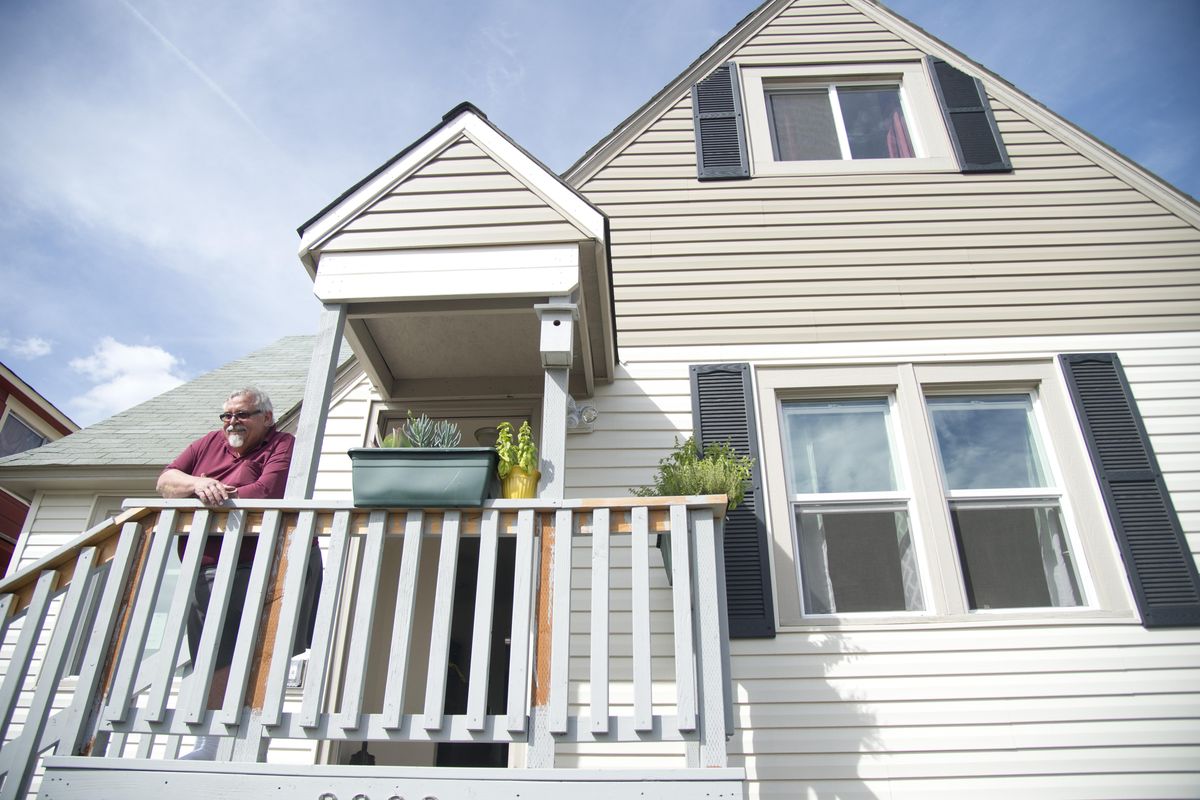‘Win for everybody’: Private company, Cogo Capital, rehabs former Spokane drug house

“Rat feces an inch thick on every surface.”
That’s how Jeannette Leckvold remembers the house on West College Avenue the first time she walked in.
Last year, the city boarded up the two-story home at 2332 W. College Ave. as a drug nuisance and arrested the owner, Janette Johnson. Neighbors said the home caused an unending series of problems and disruptions, with people getting into loud fights, showering naked outside in broad daylight and coming and going at all hours of the night. Police were called to the house 276 times between Jan. 1, 2012 and March 17, 2015.
Boarding up the house brought quiet back to the neighborhood, but did nothing about the eyesore the house had become. Trash littered the side yard and backyard. Paint peeled off the front. Inside, graffiti on the wall proclaimed, “There’s no i in team but there’s a me in meth.”
Then Coeur d’Alene-based Cogo Capital, a real estate investment lending company, approached the city wanting to buy Johnson’s property; city officials jumped at the chance.
Cogo bought the house last December for about $25,000, company owner Lee Arnold said. Arnold owns several businesses focused on real estate investing and specializes in flipping houses that have been foreclosed on or fallen into disrepair.
Johnson owed the city a little over $25,000 for costs related to boarding up her home multiple times.
The city took $7,500 of the purchase price toward outstanding debts and forgave the rest.
“The city forgave a substantial amount of debt just so they could get it in the hands of someone who would do something with it,” Arnold said.
Johnson got about $10,000 out of the deal to help her get on her feet. Assistant city attorney Matt Folsom, who works with the police department on problem properties, said the payment was to make the transition easier on Johnson.
“She was losing her home, and it was a win for everybody,” he said.
The city had one condition, though: Cogo would have to do a complete makeover of the property in the next nine months, bringing it up to standards for a Federal Housing Administration loan.
“It worked beautifully,” said Rob Crow, senior manager with the city’s department of Community, Housing and Human Services.
Leckvold, who had just started at Cogo, oversaw the rehabilitation. Looking over a binder of before-and-after pictures, she remembered walking in the door and being shocked by the squalor. The toilet was full of trash. Dirty mattresses were spread around the basement, covered in syringes.
In four months, a team transformed the property, completely redoing every room in the house. The kitchen got new granite countertops. Upstairs, an open area was transformed into a second bathroom and bedroom. Cogo put about $50,000 into the renovation; in April, they sold the house for $129,000, Leckvold said.
“I feel really good about it in the neighborhood,” she said.
Retiree John Welch moved into the new home in May. He came to Spokane from Whidbey Island to be with his sons and was living with one of them on the South Hill. When he considered moving to the College Avenue home, he said his sons objected to a West Central home.
“They said, ‘You’re not moving to Felony Flats,’ ” he said. Eventually, they relented so long as Welch agreed to build a secure garage for his car.
Cogo has since purchased two other problem houses from the city and refurbished them, though neither was in as bad of shape. One is on the same block as Welch’s new home and has a new “for sale” sign out front.
Folsom and Crow said they hope to use sales like this as a tool of last resort to fix up problem houses when the owners can’t or won’t make changes. To make that happen, Crow said the city would need to create a process to identify these houses and make people aware they’re looking for buyers to fix them up.
Welch said he’s had few reminders of the house’s past since he moved in. Once, a group of three teenagers came to the door asking to see the house.
“They said, ‘We used to come over here all the time,’ and I says, ‘Well, you’re not coming here anymore,’ ” he recalled.
Neighbors who once called police regularly to complain about Johnson say Welch is a great neighbor.
“It’s been more peaceful, calm, not having that crowd here,” said Alex Rehberg, who lives in a duplex next door.
Outside, Welch grows zucchini and yellow squash. He has plans to finish the basement and turn it into a recreation room.
He maintains the upstairs as a guest bedroom and sleeps on the ground floor. Across the hall, the third bedroom is covered floor to ceiling in family photos showing Welch’s days flying planes in the Navy, as well as his parents and sons. He plans to put in a bunk bed to make a room for his grandchildren to visit, he said.
“This house really offers a lot,” he said.
This story has been updated to correct the amount Cogo Capital spent on renovation.